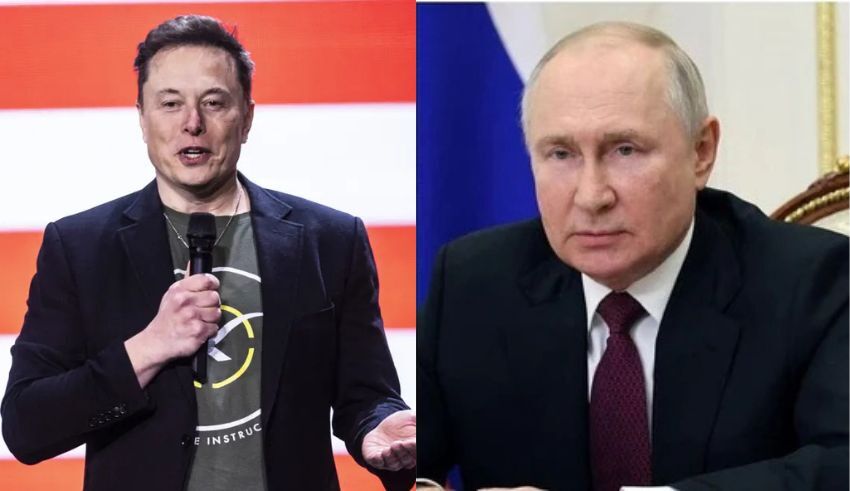
Recent revelations suggest that Russian President Vladimir Putin might be contacting Elon Musk to ask to have his Starlink internet service turned off to Taiwan, therefore benefiting China. Distributed across many Western security authorities, this information highlights the complex interactions of military strategy, international relations, and technology among ongoing geopolitical concerns. According to reports, Musk and Putin have had close talks with contacts returning late in 2022. These kinds of events raise important questions about the impact of private tech leaders on global political dynamics and the results of their decisions.
Alleged Demand of Putin and Strategic Reversals
Two officials purportedly informed the Wall Street Journal that Putin apparently asked Musk to cease Starlink services in Taiwan as a sign of respect for Chinese Premier Xi Jinping during their negotiations. This demand highlights Russia’s attempts to mend its relations with China in line with sanctions imposed in reaction to the war in Ukraine. The likelihood of Moscow going to support its geopolitical ambitions as Russia attempts to validate ties and boost military collaboration indicates the degree Moscow may go to influence a big technological provider like SpaceX.
Elon Musk has lately gotten fairly active in endorsing Donald Trump, right before the November 5 U.S. election. Western intelligence analysts would be wary about Musk’s contacts with Putin since they would imply a possible re-engagement with the Russian leader. Particularly in view of the interests of powerful nations under risk, Musk’s ties have sparked debates on the consequences of private-sector involvement in military and political matters. Musk’s several positions as a tech pioneer and political figure complicate the narrative on how Starlink can influence world security.
Starlink’s Location in Conflict Areas
Especially in Ukraine’s continuous war, Starlink—the satellite internet service developed by Musk’s SpaceX—has been crucial in providing consistent communication networks in conflict areas. Reports early this year showed Russian forces searching for Starlink terminals to complement their military operations. This report sparked off alarms in Washington as House Democrats voiced concerns over Russia’s suspected illegal acquisition of Starlink technology, therefore perhaps avoiding U.S. government enforced sanctions. The fact that Russian agents use middlemen in Dubai to buy Starlink terminals highlights even more the degree to which they are ready to go to have access to advanced communication technologies.
Problems of National Security and Congressional Review
Two Democrats on the House Oversight Committee issued SpaceX a letter in March asking for information on allegedly illegal Russian acquisition of Starlink terminals. Possibly in violation of U.S. sanctions, the letter included claims from Ukrainian intelligence sources regarding Russian military activities in eastern Ukraine being planned utilizing these terminals. Such use poses serious national security concerns since hostile parties opposing U.S. objectives could exploit the technology meant to enable communication in combat zones.
Keep Reading
Elon Musk, the designer of SpaceX, has been close to U.S. military and intelligence sectors, providing NASA and the Pentagon with necessary launch capacity. While Musk has formally denied any ties to the Kremlin, he has called claims of cooperation with Putin as “absurd.” Additionally refuting the allegations, Kremlin spokesman Dmitry Peskov said that Putin and Musk do not usually interact. These denials assist both sides to manage the narrative around their own operations on the geopolitical terrain, therefore isolating them from the results of such contacts.
The situation of Taiwan: historical background and current tensions
In international affairs, Taiwan is still a very divisive subject particularly in reference to China’s claims over the island. Retrenched to Taiwan in 1949, the Chinese Nationalist Party (KMT) left after the civil war separating it from the Chinese Communist Party (CCP). China has maintained that, ever then, “reunification” is inevitable and that Taiwan is within its boundaries. Historically, the US has supported Taiwan’s defense; President Joe Biden committed to protect the island against possible Chinese aggression.
The current government of Taiwan has emphasized under President Lai Ching-te its commitment to defend its sovereignty. Lai reiterated in a recent speech that Taiwan will not grant any territory, therefore reaffirming the island’s commitment to uphold its democratic values and preserve its identity in face of outside pressures. Lai’s remarks matched growing military tensions in the Taiwan Strait as China carried out large war simulations and live-fire exercises near the island.
Events involving China and the International Community
Though the Chinese government has officially remained neutral on the Russia-Ukraine situation, it has repeated Putin’s assertions that Western aggression started the conflict. Reacting to Taiwan’s defense of its sovereignty, Chinese Foreign Ministry spokesman Lin Jian rejected Lai’s comments, arguing that unification with Taiwan is inevitable. Complicating diplomatic ties in the region, China’s battle with Taiwan keeps becoming increasingly fierce.
The United States has lately been increasingly aggressive in punishing Chinese businesses for supplying weapons to Russia and accuses them of collaborating with the Russian defense industry. These acts depict the intricate network of worldwide alliances and conflicts shaping the geopolitical environment of today.
Putin’s alleged demand on Musk to turn down Starlink services to Taiwan catches the intricate relationship between geopolitics and technology. Beyond the tech sector, the effects of tech giants like Musk negotiating their obligations in world events can be felt in military strategy and diplomatic relations. Policymakers who have to evaluate the prospective consequences of technology in conflict situations must encounter particular challenges in the confluence of private enterprise with state objectives.
The actions of Musk, Putin, and world leaders will be much observed as things change. The dynamics between Russia, China, and Taiwan remain unstable, hence the responses of the world community will be rather crucial in deciding the direction of these interactions. The shifting terrain highlights in an era of ever connected technology, politics, and military capability the requirement of awareness and strategic foresight.



